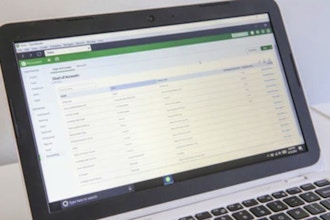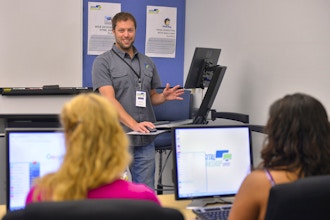Best QuickBooks Classes in Seattle
QuickBooks is an accounting software package developed by Intuit. It's designed primarily for small and midsize businesses to simplify their financial management processes. With its impressive features, QuickBooks provides tools for managing and tracking invoices, expenses, bill payments, and payroll functions. These types of tasks require accuracy and speed, leaving little room for error. QuickBooks makes the accounting process easier by providing users with a secure and reliable way to manage financial data.
Why should you learn QuickBooks? First and foremost, it's industry-standard software, meaning mastering QuickBooks can give you a competitive edge in numerous job areas. It's also a powerful tool for entrepreneurs. If you're a small business owner, QuickBooks can help you keep strict control over finances and monitor a company's financial health. Additionally, it can streamline financial tasks. No longer will you have to work through spreadsheets, as QuickBooks can automate numerous tasks, helping to reduce errors. Last, learning QuickBooks can lead to cost savings. By managing accounts in-house rather than outsourcing, businesses can keep control over their financial data and save money. This is crucial for any business looking to maximize their growth potential.
Best QuickBooks Classes & Schools in Seattle
The best way to master any new skill set is to get hands-on training. That's because professional classes have a curriculum designed to cover the nuances of QuickBooks while familiarizing individuals with its features and how to get the most out of it. Here are some of the most popular QuickBooks classes and schools in Seattle.
The QuickBooks Online for Beginners class from Digital Workshop Center is a great starting point for beginners who want to dive into the software. It will enable them to learn all of QuickBooks Online's essential features, from creating lists and adding customers to managing transactions and banking reconciliations. The course has an expert instructor with industry experience and provides all the necessary information to get comfortable with the software. By the end of the class, participants should be able to set up a company file, create chart accounts, create estimates, and record transactions. The class is three days long and costs $1406, due in full before the start date.
Noble Desktop, a leading tech and design training provider, offers a QuickBooks Online Level 1 class with one day of in-person training. The course covers everything from QuickBooks fundamentals to setting up invoices, tracking inventory, and creating reports. It is tailored to entrepreneurs, small business owners, bookkeepers, and those new to accounting and finance. After completing the class, participants should be able to create a chart of accounts and enter transactions into QuickBooks. They will gain a comprehensive understanding of how to use the software. The six-hour class costs $229, due in full before the start date.
There is also the QuickBooks Online Part I (Online) from Computer Training Source, Inc., a one-day course that covers the basics of the software. It will teach individuals how to manage vendors and inventory, handle accounts receivable, prepare invoices, generate reports, and reconcile bank statements. The class is designed for those who want to gain experience working with a mock company to practice the software's features. The overall course objectives are discussed in detail and explained with real-world examples to allow students to apply the software to their business scenarios. The course is offered live online and costs $425, payable upon registration.
Another option is the QuickBooks Desktop Part I (Online) course from Computer Training Source, Inc., which has everything a beginner needs to get up and running with QuickBooks Desktop. It walks participants through setting up a company file, making lists, adding customers and vendors, creating invoices and purchase orders, performing banking tasks such as reconciliation, and tracking sales tax payments. It's a good resource for those who want to understand the software's essential components and how to use it.The course is live online, one day long, and costs $499, payable upon registration.
Those looking for a more personalized experience can check out the QuickBooks Desktop Part II (Online), also from Computer Training Source, Inc. This intermediate-level course is suitable for those who already have some knowledge of the software. It will cover more advanced functions, such as payment processing, working with different types of invoices, inventory management, financial statement analysis, and data importing/exporting. There are seven hands-on lessons for participants to complete and four appendixes to enhance their understanding of the software. The level one course offered by the school is the only prerequisite for the course. The class is approximately six hours long and costs $850, due in full at registration.
There is also the three-hour Quickbooks (Online) class from Discovery Center for those short on time. The course will introduce participants to the core concepts of QuickBooks Online and teach them how to manage customers, vendors, bank accounts, and inventory. It also covers more advanced topics such as creating sales receipts, tracking and reporting transactions, generating estimates and invoices, reporting payroll, and setting up user access/privileges. Designed for busy professionals who need to learn QuickBooks swiftly, it is available as a live online course. The class costs $75, due before the start date.
Those looking for a wider range of topics while still learning Quickbooks should consider the Bookkeeping Fundamentals class from the Digital Workshop Center. This comprehensive course covers topics such as accounts receivable, accounts payable, chart of accounts, expense tracking, taxes, and financial statements. It also introduces participants to Quickbooks Online and teaches them how to use it in the context of bookkeeping. There is a focus on real-world business scenarios so that participants can apply their knowledge to their own practices. The live online course is three days long and costs $1046, due in full before the start date.
Last, the Payroll Fundamentals class from the Digital Workshop Center is another excellent starting point for any type of professional needing to learn how to do payroll in QuickBooks. This course covers setting up and processing payroll, tracking earned wages and taxes, understanding withholdings, and calculating overtime pay. Participants will also be introduced to the basic concepts of payroll management and understand how it works with different industry software. The class is three days long and focuses on real-world scenarios within QuickBooks, taught by a Quickbooks ProAdvisor. The total cost for this course is $1,046.
Seattle Industries That Use QuickBooks
Seattle has a dynamic economic landscape driven by the tech industry. In fact, the tech industry makes up 30% of the area's economy, according to the Seattle Times. QuickBooks has become popular with the growth of businesses and the increased demand for financial software to keep these operations organized. Here are some key industries in Seattle that often use QuickBooks.
Tech Startups and Major Tech Companies
The technology industry in Seattle is a fast-growing sector with many businesses that benefit from QuickBooks. From new startups to established tech giants like Microsoft and Amazon, these companies handle a large number of financial transactions daily. QuickBooks can provide a streamlined approach to managing these transactions, from tracking sales revenue and handling payroll to performing financial forecasting. Integrating QuickBooks into their financial management systems allows tech companies to focus on what they do best: driving technological advancements.
Retail and Ecommerce
With Amazon's large presence, it's no surprise that Seattle has become a hub for ecommerce. QuickBooks is essential in helping these companies manage large amounts of inventory, sales, and other data. For brick-and-mortar retailers and online sellers alike, QuickBooks offers a suite of tools for tracking sales, managing vendor relations, and forecasting financial trends, ensuring businesses can focus on their operations.
Bio & Health Tech
Seattle is also known for its thriving biotech industry. Companies in these sectors often have complex accounting needs due to their significant expenses and, sometimes, global operations. QuickBooks, especially its more advanced versions, offers features that help these companies maintain compliance, track their funding sources, and manage expenses across different projects. Without the right accounting tools, these companies can quickly become constrained by the complexity of their finances and fail to maximize growth.
Game Development
The Emerald City has a thriving gaming industry, with major studios like Nintendo of America nearby. From indie developers to established studios, these game development companies have unique financial requirements. Whether tracking royalties, managing contracts with designers and voice actors, or handling the revenue from game sales, a tool like QuickBooks is invaluable. The software's adaptability and diverse feature set make it a go-to for companies that might not fit the traditional business mold but still have intricate accounting needs.
SaaS Industry
The software as a service (SaaS) industry is booming in Seattle, and QuickBooks is a valuable tool for these businesses. SaaS companies require financial tracking due to high customer volume. QuickBooks serves these companies in managing subscription billing, tracking customer churn rates, and analyzing revenue growth. By leveraging QuickBooks, SaaS companies can maintain an accurate view of their financial health, allowing them to make informed business decisions.
QuickBooks Jobs & Salaries in Seattle
QuickBooks expertise opens the door to numerous job opportunities in Seattle. Here's an overview of some QuickBooks-related jobs and their average annual salaries in the Seattle region.
A Bookkeeper primarily records financial transactions, manages bank statements, oversees accounts payable and receivable, drafts financial reports, and maintains financial records. In some businesses, they might also oversee payroll, manage monthly closings, and contribute to tax preparations. The role demands familiarity with QuickBooks software, keen attention to detail, a foundational grasp of accounting principles, robust organizational skills, and apt communication abilities. The average salary for a Bookkeeper in Seattle is $48,000, but pay can be as high as $53,000 for an experienced professional.
QuickBooks ProAdvisors serve as specialized experts in the industry. They assist businesses in setting up and refining their QuickBooks systems. They're typically tasked with troubleshooting software issues, training staff on the platform, customizing software features to cater to specific demands, and advising on best practices. ProAdvisors need a deep knowledge of QuickBooks, often validated by official certification, to excel in this role. They should also possess strong communication skills and the ability to solve diverse software-related challenges. The average salary for a QuickBooks Pro Advisor is $50,000, with $73,000 being the top end of wages.
An Accountant has responsibilities that transcend the scope of basic bookkeeping. Their duties encompass tax planning, audit support, financial statement creation, budget oversight, and comprehensive financial analysis. Ensuring strict adherence to financial regulations is also a pivotal part of their job. Additionally, they often provide businesses with strategic financial counsel. Generally, Accountants are expected to have a bachelor's degree in accounting or a closely related discipline. Proficiency in tools like QuickBooks is necessary, especially for businesses that rely on this software. Accountants in Seattle make an average salary of $67,000, but this can range from $61,000 to $74,000.
Tax Preparers are crucial to any business. They offer advice and assistance in filing income tax returns, taking advantage of available exemptions, and tracking deductible expenses. In addition to accounting expertise, they must possess knowledge of the relevant taxation laws applicable to their region or industry. A Tax Preparer should deeply understand QuickBooks software, especially its more advanced features, as this is a vital element of the job. The average salary for a Tax Preparer in Seattle is $53,000, ranging from $48,000 to $59,000 depending on experience and knowledge.























